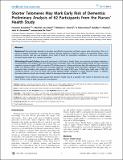| dc.contributor.author | van Oijen, Marieke | |
| dc.contributor.author | Irizarry, Michael C. | |
| dc.contributor.author | Grodstein, Francine | |
| dc.contributor.author | Rosas, Herminia Diana | |
| dc.contributor.author | Hyman, Bradley Theodore | |
| dc.contributor.author | Growdon, John Herbert | |
| dc.contributor.author | De Vivo, Immaculata | |
| dc.contributor.author | Khoury, Joseph | |
| dc.date.accessioned | 2012-01-09T00:54:40Z | |
| dc.date.issued | 2008 | |
| dc.identifier.citation | Grodstein, Francine, Marieke van Oijen, Michael C. Irizarry, H. Diana Rosas, Bradley T. Hyman, John H. Growdon, and Immaculata De Vivo. 2008. Shorter telomeres may mark early risk of dementia: preliminary analysis of 62 participants from the nurses' health study. PLoS ONE 3(2): e1590. | en_US |
| dc.identifier.issn | 1932-6203 | en_US |
| dc.identifier.uri | http://nrs.harvard.edu/urn-3:HUL.InstRepos:7349726 | |
| dc.description.abstract | Background: Dementia takes decades to develop, and effective prevention will likely require early intervention. Thus, it is critical to identify biomarkers of preclinical disease, allowing targeting of high-risk subjects for preventive efforts. Since telomeres shorten with age and oxidative stress, both of which are important contributors to the onset of dementia, telomere length might be a valuable biomarker. Methodology/Principal Findings: Among 62 participants of the Nurses' Health Study, we conducted neurologic evaluations, including patient and caregiver interviews, physical exam, neurologic exam, and neuropsychologic testing. We also conducted magnetic resonance imaging (MRI) in a sample of 29 of these women. In these preliminary data, after adjustment for numerous health and lifestyle factors, we found that truncated telomeres in peripheral blood leukocytes segregate with preclinical dementia states, including mild cognitive impairment (MCI); the odds of MCI were 12-fold higher (odds ratio = 12.00, 95% confidence interval 1.24–116.5) for those with shorter telomere length compared to longer telomere length. In addition, decreasing telomere length was strongly related to decreasing hippocampal volume (p = 0.038). Conclusions: These preliminary data suggest that telomere length may be a possible early marker of dementia risk, and merits further study in large, prospective investigations. | en_US |
| dc.language.iso | en_US | en_US |
| dc.publisher | Public Library of Science | en_US |
| dc.relation.isversionof | doi://10.1371/journal.pone.0001590 | en_US |
| dc.relation.hasversion | http://www.ncbi.nlm.nih.gov/pmc/articles/PMC2536511/pdf/ | en_US |
| dash.license | LAA | |
| dc.subject | geriatrics | en_US |
| dc.subject | dementia | en_US |
| dc.title | Shorter Telomeres May Mark Early Risk of Dementia: Preliminary Analysis of 62 Participants from the Nurses' Health Study | en_US |
| dc.type | Journal Article | en_US |
| dc.description.version | Version of Record | en_US |
| dc.relation.journal | PLoS ONE | en_US |
| dash.depositing.author | Grodstein, Francine | |
| dc.date.available | 2012-01-09T00:54:40Z | |
| dash.affiliation.other | SPH^Epidemiology | en_US |
| dash.affiliation.other | HMS^Medicine-Brigham and Women's Hospital | en_US |
| dash.affiliation.other | HMS^Neurology-Massachusetts General Hospital | en_US |
| dash.affiliation.other | HMS^Neurology-Massachusetts General Hospital | en_US |
| dash.affiliation.other | SPH^Epidemiology | en_US |
| dash.affiliation.other | HMS^Medicine-Brigham and Women's Hospital | en_US |
| dc.identifier.doi | 10.1371/journal.pone.0001590 | * |
| dash.authorsordered | false | |
| dash.contributor.affiliated | Rosas, Herminia | |
| dash.contributor.affiliated | Khoury, Joseph | |
| dash.contributor.affiliated | De Vivo, Immaculata | |
| dash.contributor.affiliated | Hyman, Bradley | |
| dash.contributor.affiliated | Growdon, John | |
| dash.contributor.affiliated | Grodstein, Francine | |


